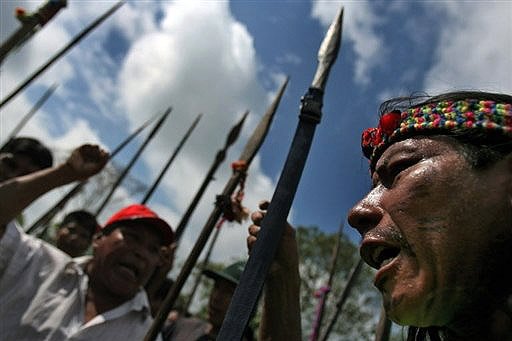Peru to suspend land laws after violence
Financial Times | 11 June 2009
Peru to suspend land laws after violence
By Naomi Mapstone in Lima

Peru’s Congress is moving to suspend the passage of laws at the heart of a lands right dispute with Amazonian indigenous tribes that sparked the worst violence the country has seen since the Maoist Shining Path insurgency.
The official death toll of 30 protesters and 24 police officers is contested by indigenous leaders, who accuse the armed forces of hiding bodies. The government denies the charge.
Mercedes Aroaz, trade and tourism minister, said a 90-day suspension of decree 1090, which would give the government the power to sell deforested land to private entities, would im-prove the chances of negotiating a solution. "If a suspension is temporary and gives the opportunity for dialogue and establishing consultation mechanisms, then we agree," she said.
But the suspension falls well short of the protesters’ demands to repeal the legislation. They say decrees, being passed in part to comply with a trade agreement with the US, weaken their rights to land they have inhabited for hundreds of years. They fear decree 1090 would create a loophole whereby illegal deforestation would pave the way for the sale of land to oil, gas or mining interests, and decree 1064 would end the need for companies to consult indigenous communities before starting work.
An army curfew in the northern Amazonian town of Bagua has restored order, after the clash between more than 600 police officers and 2,000 protesters blocking a central highway escalated into riots, looting and the kidnapping of 38 police, nine of whom died.
Tensions remain high, however, with a national strike today and calls by indigenous leaders for the resignation of Yehude Simon, prime minister, and Mercedes Cabanillas, interior minister. Carmen Vildoso, minister for women and social development, resigned her cabinet post in protest at the government’s handling of the violence.
President Alan Garcia called the protesters "ignorant", suggesting they were being manipulated by leftist forces outside Peru, interpreted to mean Hugo Chávez, of Venezuela, or Evo Morales, of Bolivia. After Alberto Pizango, an indigenous leader whom the government charged with sedition, was granted asylum in Lima’s Nicaraguan embassy, Daniel Ortega, Nicaragua’s leftist president, was added to the list.





